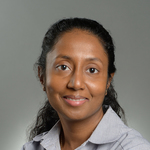
Sep. 29, 2020
Dr. DeSouza Appointed to Associate Editor Position for IEEE Transactions on Artificial Intelligence
Dr. Gui DeSouza, MUIDSI core faculty member and co-leader of the Data-Driven Ag Initiative, has been appointed as an associate editor to the new journal IEEE Transactions on Artificial Intelligence. The Institute of Electrical and Electronics Engineers plans to launch the journal next month. It’s a joint publication among several IEEE societies, with IEEE’s Computational Intelligence Society (CIS) taking the lead. To read more about the journal and Dr. DeSouza’s appointment, click here.

Sep. 28, 2020
Data Analytics Using the Cerner Real-world COVID-19 Data to Answer Clinical Questions
Cerner Real World data allows researchers and data scientists to explore clinical data via HealtheDataLab. Recently, Cerner granted many of their client institutions access to de-identified patient’s data for COVID-19 research to help fight the pandemic. The de-identified patient data was dataset contains COVID-19 related encounters, demographics, chronic conditions, medication, and lab results. This large-scale cohort allows for the investigation of the relationships between risk factors, comorbidities, complication and specific outcomes. However, due to variable accuracy and completeness of data, usage of EHR data for research purposes requires an in-depth understanding of potential pitfalls which could lead to inaccurate or unrepresentative…

Sep. 21, 2020
Improving interpretation of Genome-Wide Association Studies (GWAS) by quantifying Marker Recurrence
To understand biological differences within groups of people or animals, we often turn to DNA. A genome-wide association study (GWAS) can assess the genetic contribution of biological differences between individuals. However, the scale of input data continues to expand in three ways: the sequence coverage of genomes, the number of individuals sequenced, and the number of phenotype records per individual. High-throughput workflows are computationally intensive and require a laborious interpretation of results. These barriers inhibit systematically investigating hypotheses and limit the effective translation of genetics into biomedical and agricultural solutions. The expansion of data analyzed, compounded by numerous analysis approaches,…

Sep. 21, 2020
Implementing GeoARK: The Geospatial Analytical Research Knowledgebase
This research focuses on the development and implementation of an interface to the Geospatial Analytical Research Knowledgebase (GeoARK), a spatially enabled big data informatics approach assembled around applications in health research and analytics. Example applications in telehealth reach, COVID-19 risk in rural situations, pathways for zoonotic disease spread, and contextual leukemia research will be provided. The creation and design of GeoARK occurred within the University of Missouri’s Institute for Data Science and Informatics. Being spatially engendered, its core is data that is pre-processed, cleaned, integrated and represented in its spatial context as millions of point locations. To this core, additional…

Sep. 14, 2020
An R-based platform for the visualization and analysis of single molecule tracking experiments
Single molecule tracking (SMT) is a technique of single-molecule fluorescence imaging that allows for the exploration of molecular motion at a high spatiotemporal resolution on living cells. This is widely used to define dynamics of individual tumor cell-surface receptors. Spatiotemporal regulation of many of these receptors varies across cancer types, playing a key role in tumor progression and drug resistance. Many tools can be used to identify trajectories and calculate their features from these experiments. However, there are relatively few tools to analyze this data. Thus, the present study uses a set of live-cell single-molecule imaging experiments with a model…

Aug. 14, 2020
MUIDSI and MUIDSI Graduate Student Organization to Host Virtual Symposium August 20th-21st
Join us on August 20th-21st as we host our annual Data Science and Informatics Symposium online via Zoom. This year we welcome four keynote speakers, a keynote panel, six faculty research talks, four student presentations, a start-up panel, and a COVID-19 panel featuring the latest contributions from MU faculty and students. For a full schedule click here. For free registration, please visit our Eventbrite site.

Aug. 14, 2020
Three NSF RAPID grants led by MUIDSI Core Faculty to Tackle COVID-19 Pandemic
MUIDSI core faculty are leading the following ongoing NSF RAPID projects for COVID-19: Dr. Steven Van Doren is the sole PI for “RAPID: Structure of Membrane-Bound Fusion Peptide of SARS-CoV-2 Required for Infection.” Dr. Praveen Rao is the PI for “RAPID: Democratizing Genome Sequence Analysis for COVID-19 Using CloudLab” with Co-PIs Drs. Wesley Warren, Peter Tonellato, Eduardo J. Simoes, and Deepthi Rao. Dr. Chi-Ren Shyu is the PI for “RAPID: Geospatially-Enabled Deep Analytics for Real-time Mitigation and Response to COVID-19 Outbreak for American Rural Populations” with Co-PIs Drs. Mirna Becevic,…

May 20, 2020
Artificial Intelligence Driven Framework for the Structurization of Free-Text Diagnostic Reports
Diagnosticians record, share, and store a wealth of data on patients, diseases, and biomedical processes in free-text diagnostic reports. To continue providing advanced biomedical services, healthcare organizations should efficiently and effectively perform complex data management, aggregate data resources, and ensure the interconnectivity and interoperability of biomedical data sets. However, free-text is a poor starting point for the computational analysis of complex biomedical information. For data management applications, diagnostic reports, biomedical test results, diagnostic images must be in a structured and machine-readable format. Free-text diagnostic reports lack data structure, making it challenging to extract information and use it for medical care…

May 4, 2020
Cancer Research Funding: Where is the Money?
Cancer is one of the most common and deadly diseases and its incidence is increasing. There are over one hundred types of cancer and they have a varied impact on society and those affected. Some have known, preventable causes and some are poorly understood. Some can be detected early and some are only detected in an advanced stage. Some are very treatable and some have a very high mortality rate. In order to level the playing field for cancers, there needs to be research to understand more about poorly understood cancers. What is the present state of cancer research funding?…